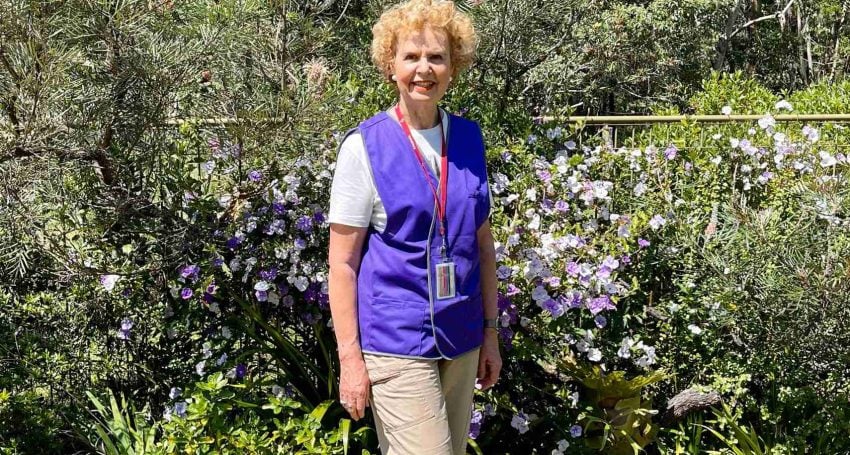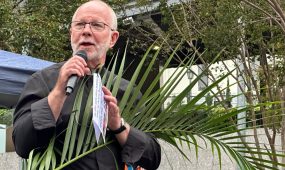How did I end up ministering one day a week at the Arthur Gorrie Correctional Centre, speaking with the men in green?
Reflections
“A tall intimidating-looking man was walking towards me. His head was shaved and tattooed. I remained motionless, rooted to the spot. As he passed me, he whispered, ‘God bless’,” says Cheryl Courtice on her early prison chaplaincy experience

A tall intimidating-looking man was walking towards me. His head was shaved and tattooed. I remained motionless, rooted to the spot. As he passed me, he whispered, “God bless.”
How did I end up ministering one day a week at the Arthur Gorrie Correctional Centre, speaking with the men in green? Most of the men look like teenagers — so very young.
The answer is worth reflecting on, so here goes…
In 2021 I felt drawn to pursuing some clinical pastoral education (CPE). I had friends coping with ageing, illness, dementia, death and other big life stuff. I felt I might be more helpful to them if I went beyond giving them something delicious to eat and making them laugh.
I did a foundational CPE course through the Queensland Institute of Clinical Pastoral Education with Cathy Brown, and it was life changing. The course was quite intense, and I learnt a lot about myself and how to properly listen to others.
As part of this CPE training, I was involved in pastoral care at a local hospital and in my local parish. I also practised my new skills while conversing with my friends, usually over the phone, during a time when COVID-19 was keeping us physically distant.
My husband, Tim, had been involved in prison chaplaincy for many years, visiting the Brisbane Correctional Centre weekly and leading the four Sunday services every six weeks. He finds it very rewarding and often wondered, out loud, if I might too?
Advertisement
At the start of 2023, Tim decided to change chaplaincy service providers and move to Anglicare Southern Queensland. This also involved a change from the Brisbane Correctional Centre to the Arthur Gorrie Correctional Centre.
I remember the exact moment one night when I suggested that this change might make it a good time for me to “give it a go”. The words just came out of my mouth. I think I was as surprised as Tim. Anyway, the words were out there, and we subsequently began the process. God works in mysterious ways.
The chaplaincy onboarding process was longer than I expected; however, at 8.30 one July morning last year, after flying in the previous night from a nine-week overseas trip, we were in our induction course at the Arthur Gorrie Correctional Centre.
The induction was confronting at times. Behind the razor wire and chain-link fences we learnt about the potential for being manipulated by inmates. Our fingerprints were taken and we heard about the guard dogs. By the time we were taken on a tour of the prison, I was wide eyed and nestled into the middle of the group. When we passed some of the men in green my heart rate increased.
Advertisement
I wanted to train alongside Tim, so two days later we made our first visit. We met another chaplain, a Catholic priest, to learn the ropes.
Prison chaplaincy is about listening. The inmates often have no one safe to talk to. Other inmates could use what is said against them and if they talk to the guards they may be seen as “dogs” (informers). As with hospital and parish chaplaincy, I must put my story and curiosity aside and meet them where they are at, and listen to what they want to talk about. I need to be accepting, open hearted and available to hear whatever they want to tell or ask me.
Often when people are really given the chance to open up, they unravel their own problems, with the solutions becoming clearer to them in the process. Theologian and anti-Nazi dissident Dietrich Bonhoeffer writes in his letters and papers from prison, “But I can’t help sharing my thoughts with you, for the simple reason that that’s the only way I can clarify my own mind.” This is the real benefit to the inmates — having someone listening to them.
One young fellow was distressed because bad things kept happening to him. We talked about breathing, pressing the pause button between the stimulus and the response (instead of immediately reacting) and using agency to choose a response — breathing God in. He was happy to report back during following visits that he was feeling much calmer, making better decisions and reconnecting with his family the best that he could from prison. He was also making constructive and supported plans for his release. This was certainly a highlight for me — hopefully a young life back on track.
I have been impressed at how well-mannered the inmates generally are. They are courteous and polite, frequently thanking us for our visits. I am also often impressed by the strong faith I see. Admittedly, the ones who want to talk, usually want to talk about God — this has, in turn, done great things for my faith. I am usually a follower of the idea to “preach the Bible constantly, occasionally use words”. So this prison community has me sharing my faith one full day per week — more than the rest of the week put together. It’s wonderful and challenging!
I have also enjoyed sharing this ministry with Tim — which is probably what drew me to it. I have always found him great company, but watching how he operates and his interactions with the men have been inspirational. It has been a bonding experience that has left me with renewed admiration for his quiet, calm ways.
I believe that jails are not full of evil, but full of suffering. A young fellow came up to me shortly before I wrote this refection to see if I could say a prayer for his mother who had just died. Imagine it! I asked his name and her name before we said a prayer together. He was so grateful, but not nearly as grateful as I was to be able to shine a little of God’s light on him in that moment.
One year on, and it is still early days. Six months after the induction, I completed the required number of visits and Sunday services to be allocated an official yellow pass. I am thoroughly enjoying the chaplaincy ministry and sincerely recommend it. This kind of volunteer work takes as much time as you allow — I prioritise it around other activities in my retirement.
All the prisons, particularly the women’s prisons, are crying out for chaplains — for someone the inmates can talk with. Please consider it.
Editor’s note: If you would like to volunteer in the special ministry area of prison chaplaincy, please email Dr Stephen Harrison.





